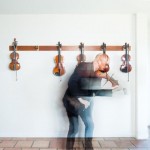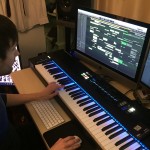Before you get too excited, this is not an interview with the game’s team of composers. We’ve already featured interviews with Osamu Kubota, S.F.A., and TaQ about the game, but this interview focuses on the actual sound team in Korea who coordinated the project. At the time this interview was conducted, I had listened, reviewedh, and had fallen in love with the Granado Espada soundtrack, and there were whispers that a Volume 2 album was in the works. We all know how that turned out.
With Volume 3 on the horizon, and Granado Espada being our Soundtrack of the Month, I thought it would be a good time to get this interview back online. I admit the team was rather vague on most points, but there are still a few interesting tidbits tucked away within. Oh, and in case you have no idea what “Sword of the New World” is, it’s the name that Granado Espada was released under in the West.
Hit the jump for a blast from the past!
Jayson: Given the setting and time period of the game, what considerations were given to the game’s audio? Were there specific instructions given to the various contributing composers to generate a certain atmosphere in the game?
Team: Sword of the New World heavily emphasizes European imagery, yet the game’s focus is on action at the same time. Naturally, the overall music tone has successfully implemented fast electronic beats along with a classical mood throughout the game. The Sword of the New World development team was certainly satisfied with the way it turned out at the end.
Jayson: The quality of the music found in Sword of the New World is definitely impressive. Tell us about the early discussions that took place regarding the game’s audio, and how the title and its music developed over time to become what it is today.
Team: The conceptual art work and the 3-dimensional graphics were presented to the music composers to provide a further realistic sense of genre. Then the background music inserts were actually titled by the composers.
Jayson: As Sword of the New World is a massively-multiplayer online role playing game, how did the team attempt to reduce the monotony of hearing the same music repeatedly throughout the game? How many minutes music are currently used in the game?
Team: The Sword of the New World’s background music lasts for about 11 hours and 6 minutes in 2.6 update version. We’ve drastically stretched out the length of music in consideration of our usual user’s extensive game-play time; this minimizes blandness in repetitions of the same background music.
Jayson: What went into the decision to hire so many composers for Sword of the New World? SoundTeMP, Kim Jungsung, and S.F.A. are all based in Korea and have ties to SoundTeMP, but how did Osamu Kubota come into the picture?
Team: As mentioned previously, we took such an ambitious approach with the music in terms of different styles and the sheer quantity that we knew relying solely on a single composer would be inadequate. A single-dimensional artist simply cannot fulfill the variety we were in search for. Naturally, we sought a team of composers, which soundTEmP and S.F.A. arose strongly recommended from past experience, while IMC suggested Junsung Kim, one of the most beloved musicians working on soundtracks in Korea. Osamu Kubota, too, had been previously popularized in Korea and we were profoundly attracted to offer him an invitation to join our vision.
Jayson: Kim Junsung did an amazing job with the beautiful piano ballads, “Granado Espada” and “Cite de Reboldeux.” Describe the creative direction behind these two important pieces of music and explain their roles within the game.
Team: “Granado Espada” is inserted as the background music for the Sword of the New World. “Cite de Reboldeux” is a piano concerto inserted as the background music for a game zone called the City of Reboldeux.
Jayson: How did world-famous electronic musician, DJ Tiësto and other electronic musicians become involved with Sword of the New World? Did they create any new music as the title or were all types of music included by these artists licensed material from their past album releases?
Team: We’d been privileged to contract with Blackhole Recordings in The Netherlands, from which DJ Tiesto and other musicians partook in our album compositions too.
Jayson: SoundTeMP’s past releases include Ragnarok Online and Arcturus -The Curse And Loss Of Divinity-, both featuring simply the top-quality pop music; how did the studio come to mostly compose trance for Sword of the New World? How did it come to the attention of the Sword of the New World team that SoundTeMP would be suited for such style of music?
Team: The Sword of the New World team is vigorously developing along with the major contributors from Ragnarok and Arcturus, and soundTeMP is a long-time partner with the team as well. Since the Sword of the New World is such a distinct game with a fast tempo and an extended length of music in the background, trance was intentionally chosen as the major genre to generate a groovy mood overall. It certainly was a successful attempt.
Jayson: Which musicians are currently on board and actively writing music for Sword of the New World? It seems like new music is added with every update, but we haven’t seen any new material from SoundTeMP, Jungsung or Kubota. Are there other musicians hired to write music for Sword of the New World?
Team: Eventually TaQ (of Bemani fame) became involved in our project from Japan. S.F.A. now functions as a key leader for our updates. Junsung Kim currently produces music for another game in development while other composers work on various projects simultaneously. As for the Sword of the New World, we’re striving to update our music in a rather grandiose scale. We’re greatly anticipated to see how innovative and stylish our background music will turn out in the end.
Jayson: What tools were used by each composer to create the score for Sword of the New World? Was a standardized format required or was each composer given complete freedom as to how they’d provide the music for the team? Did any type of post-processing take place on the sound team’s end?
Team: Each composer used their own strength in terms of instrumentation to produce uniqueness in every composition. Junsung Kim’s chose the traditional way of writing the notes on paper and converting them into MIDI format; meanwhile S.F.A. and soundTeMP decided to directly utilize Sampler and Sequencer software. Osamu Kubota initially composed his music in DTM and finished with a final touch by flying over to Beijing to record live with an orchestra. Final outcomes were collected at the mastering studio in Seoul to ultimately refinish to perfection.
Jayson: Will there be an official release of the complete soundtrack with the single promotion version of 1-disc available soundtrack? A 4-disc promotional version has been created, which we were fortunate enough to review, but the worldwide game-music fans are wondering when they will be able to purchase this impressive collection themselves.
Team: Blackhole Recordings is in the process of creating an iTunes-like streaming service from The Netherlands. Although Granado Espada Original Soundtrack Volume 2 isn’t yet planned, we will surely let everyone know when that time comes on our official website, www.granadoespada.com.
Tags: A Blast From The Past, Features, Granado Espada, Interviews, Korean, MMORPG, Osamu Kubota, S.FA., SoundTeMP, Sword of the New World, Videogame









































[…] in Games: The tunes behind the action Medal of Honor soundtrack available via iTunes. Granado Espada sound department interview is a blast from the […]
[…] composer group: SoundTeMP, S.F.A., Junsung Kim, and Osamu Kubota. The game’s sound department defended the decision to host a variety of composers in an interview, saying, “We took such an ambitious approach […]
[…] composer group: SoundTeMP, S.F.A., Junsung Kim, and Osamu Kubota. The game’s sound department defended the decision to host a variety of composers in an interview, saying, “We took such an ambitious approach […]